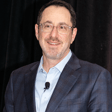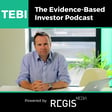Become a Creator today!Start creating today - Share your story with the world!
Start for free
00:00:00
00:00:01

Ep 28: Elroy Dimson on coronavirus and the financial markets
We are living in extraordinary times, with billions of people around the world more or less confined to their homes as a result of the coronavirus pandemic. It’s very unclear how long it will take for things to return to normal. Indeed, some aspects of our lives may never be quite the same again.
As well as the health concerns that people naturally have, there is also a great deal of fear and uncertainty about the impact of the virus on the economy and the financial markets.
To help explain what’s going on, and to provide some reassurance about recent market volatility, I’ve been speaking to one of the world’s most eminent financial historians, Professor Elroy Dimson, for the latest episode of the TEBI Podcast.
Transcript
Introduction to Pandemic Impact
00:00:03
Speaker
Hello and welcome to a special edition of the TEBI podcast. I'm Robin Powell and this is the official podcast of my blog, The Evidence-Based Investor, produced by Regis Media.
00:00:18
Speaker
As everyone knows by now, we're living in extraordinary times. Billions of people around the world are more or less confined to their homes as a result of the coronavirus pandemic. This is of course a human tragedy. Hundreds of thousands of people will lose their lives.
00:00:37
Speaker
but there are massive implications for the economy too. Most economists agree we're heading for a deep recession which could last for a long time. As a result stock markets have fallen around the world.
Expert Insights: Professor Elroy Dimson
00:00:52
Speaker
Our guest on this episode is someone who understands more than just about anyone else alive today how financial markets have responded to economic shocks like this throughout history.
00:01:04
Speaker
Professor Elroy Dimson chairs the Centre for Endowment Asset Management at Cambridge Judge Business School and is Emeritus Professor of Finance at London Business School. He chairs the Policy Board and the Academic Advisory Board of FTSE Russell and is also on the board of the Evidence-Based Investment Consultancy, Sparrows Capital.
00:01:28
Speaker
He's an accomplished author and is co-author of the Credit Suisse Global Investment Returns Yearbook. Professor Dimson joins us now. So Elroy, thank you very much indeed for joining us. I take it you're at home self-isolating? I am indeed self-isolating and for the moment in an empty home.
00:01:52
Speaker
Right, okay. You're probably most famous for the book that you co-wrote with Paul Marsh and Mike Staunton, Triumph of the Optimists, which really was about the way that optimistic investors actually ended up on top in the 20th century.
00:02:14
Speaker
And if I recall in that book, you also talked about what might happen in the 21st century. Just remind me what you actually said. Well, I've got a copy of Triumph of the Optimists here in front of me. And to refresh my memory, I went back to our paragraphs that concluded all of the implications for investors. And I'd like to read one out to you because
00:02:43
Speaker
We haven't looked at it for a while and Paul Marsh and Mike Saunton and I reminded ourselves just recently about how we concluded. And here's the paragraph. We concluded that because business itself is risky and because the years ahead will bring new forms of disorder and volatility,
00:03:07
Speaker
Instead of, or perhaps in addition to the disruptions of the past, the new century may hold continuing international terrorism, new diseases, threats of large-scale litigation and corporate liability, environmental disasters, and new pestilences as yet beyond our expectations.
00:03:28
Speaker
The counterparts, we wrote, of the world wars and the Cold War of the 20th century, may be new wars on terror, wars on drugs, courtroom wars, and wars against the forces of nature. The higher the rating at which shares are bought and sold, the more volatile will be stock prices, and the more sensitive they will be to these new threats.
00:03:53
Speaker
So viruses and plagues were on our mind as this century began. Exactly. Well, we certainly have a pestilence, a new pestilence to talk about now. You've seen a number of crashes and corrections during your career.
Historical Comparisons of Economic Crises
00:04:14
Speaker
How does the turmoil of the last few weeks compare with the others?
00:04:21
Speaker
Well, I think part of it is that looking back a relatively short period, the way in which it's advanced has been quite shocking. And the lapse from when we first knew about this until the effects of the virus were global was long enough to do more than was done in most countries. And yet things moved relatively fast.
00:04:50
Speaker
So I find in health terms the outcomes are quite shocking and yet there are plenty of precedents in history which were pretty dreadful and we're in one of those now and it's by no means the most dreadful in history.
00:05:10
Speaker
Well, that's certainly reassuring to hear. Fears about the spread of coronavirus have clearly played a major part in recent volatility. But there's usually more than one issue involved, isn't there? And what other factors do you think have been at play this time? Well, I think it's the increased connectedness of stock markets.
00:05:37
Speaker
Let me give you two parallels. Each parallel cost something like 50 million lives. I'm a professor at Cambridge University, as you'll remember, and my college is Gonville and Keys. Gonville and Keys came into existence in the 1300s, and within a few months of the foundation of the college, the Black Death arrived in Britain.
00:06:01
Speaker
Black Death progressed in a plague-like way, cost about 50 million lives around the world and took about two years from arrival in Britain till it moved on to other countries.
00:06:18
Speaker
And then, excuse me, if I use a timescale, which is rather Cambridge-like, and then somewhat more recently, not half a millennium, but just essentially ago, we had the post-World War I pandemic of the influenza, which also cost about 50 million lives. 50 million lives were a smaller proportion than the deaths that are estimated from the Black Death because the world had more people living in it than.
00:06:49
Speaker
And that again took at least a period of quite a large number of months to have its impact in each region that it reached, whether we're talking about the United States or Britain or other locations.
00:07:04
Speaker
So there have been some dreadful times before. So far as we can tell, coronavirus is far from being one of the most deadly viruses, but it's international travel and factors like that, which have enabled it to spread with remarkable rapidity. And stock markets have been quite correctly spooked by this.
00:07:30
Speaker
You mentioned the flu epidemic that followed the First World War. I suppose what's quite encouraging is the fact that if you'd been an investor in 1914, say,
00:07:46
Speaker
And things would have looked pretty grim when the world war started and got progressively more grim. And then you had this flu which killed more people than the war itself. And then after that, you had a recession. And yet, if you were patient and diversified, the 20s were actually quite rewarding to long-term investors.
00:08:14
Speaker
Well, I think you're right. Of course, when we talk in investment terms, we're measuring things in pounds and dollars and marks and so forth. And that's fearfully important, but not the most important issue. So if you were dead, you were not there to spend the wealth that you might otherwise have accumulated. And that's been one of the issues that has influenced the story as we've gone through financial market history.
00:08:44
Speaker
So, I don't want to overrate the importance of investing, but there is a natural advantage that accrues to investors who have a long time scale. So, going back to my example of an Oxbridge College, where if you ask what's the time scale for looking after our endowment, the investment committee may say, well, it's as long as I'm around,
00:09:12
Speaker
50 years or let's start since the beginning of the college 500 years. If those are your time scales, there are things that you can do, which you can't do if you need your money urgently. And so I think you'll probably want to go back to what investors should be thinking about going forward. And the person who had their money in the stock market
00:09:39
Speaker
because they were planning on a celebration, a home extension or whatever, in a few years' time, they don't have the luxury of catching up. Those whose wealth is there for the long term can benefit from what sometimes is called diversification over time, that a bad year is not necessarily followed by another bad year into another bad year.
00:10:03
Speaker
So there are big differences between the experiences of different individuals and the narrative that underlies financial market history, the stories as it were, can be very important and the impact on different sorts of individuals and institutions can be very different.
The Challenges of Market Timing
00:10:25
Speaker
Now, going back to viruses in history, I don't know whether you saw the S&P Dow Jones Indices when this whole thing started, sort of mid to late February.
00:10:40
Speaker
They produce a chart showing 12 major viruses over the last 40 years. And in all but one of those cases, the S&P 500 was actually higher six months after the original fears broke out, if you like. I mean, obviously not all information is useful information, but that's quite a telling statistic.
00:11:09
Speaker
It's telling. I think it helps us to convey a story.
00:11:15
Speaker
but the number of independent observations there since they overlap is limited. And so we've got to be a little bit cautious about that. But I think the story which it does illustrate is this, that when we're going through the good times, and the economy is prospering, and we're getting wealthier, and we project growth in cash flows and profits going forward, then the world typically looks rather safe. When it's safe, the risk premium that investors demand
00:11:45
Speaker
smaller. And when we move from that to a position in which growth is threatened, but risks also look larger, then the prospective cash flows that we can anticipate in future years get slimmer.
00:12:01
Speaker
may even get to be negative in real terms. And yet risks look larger. And so you have a double whammy. The economic position of the corporate sector looks worse. And the rate at which you discount future cash flows gets to be more penal, more harsh. And I think that's why you see these bouncebacks. If you buy at the bottom, you are likely to perform well.
00:12:27
Speaker
But the problem is we never quite know when the bottom hit us. And lots of us have been caught up by the coronavirus in my own case, and I can't be alone. We saw the falls and my wife and I thought, well, now's the time to stick our money into our annual ISA. We put it in there and congratulated ourselves.
00:12:50
Speaker
on paying substantially less than we would have done a week or two earlier. And now we've watched that all wither away. But there are others who might have been clever like me as well and turned out not to be quite so clever. I'm glad you owned up to that one, actually, Elroy. And I'm sure you weren't the only one, mainly because my own son who is studying at Stockholm University at the moment said that I noticed
00:13:19
Speaker
markets have been going down, you've been nagging me about getting in, is now a good time. And I was thinking, oh, well, should I tell him to wait till it all settles down? I said, all right, go on then. And of course, in the next two days, I think the markets went down another 15% or something. He checked yesterday. And of course, he was up. He was getting all excited saying, oh, shall I put some more in? And I said, it doesn't work like that. And of course, I'm sure if he checked it out, it'd be down again.
00:13:51
Speaker
I'm sure you're not the only one to have done that. One of the dilemmas of investing at a time like this is that when markets are volatile, it's difficult to get what you think are the right prices.
00:14:07
Speaker
typically are more volatile after there's been a major collapse. And so there you see the opportunity to get into the market. And how are you going to do it? Well, some of the people who are listening will be saying, well, partly I think for myself and partly we've got to think about perhaps an institutional investment. So let's think about it for themselves. How are they going to do it? They'll do it through a mutual fund or some other vehicle.
00:14:33
Speaker
Very often, the transaction will go through the next day. And by the next day, things may look very different. At volatile times, the spread between buying and selling prices widen. And you're going to pay something for immediacy, because that's what the market provides. And yet, you won't have immediacy. You'll have waited a day. Spreads will still be quite wide the next day. And so you'll be caught out.
00:15:02
Speaker
On the other hand, you might think about institutional investors because many people listening to this will indirectly be an institutional investor, not only going through mutual funds, but they'll have stock market exposure through their pension fund or through other activities.
00:15:20
Speaker
And there, when there's large investments to make, there's often some careful thought of markets are going down. There will be a meeting of the investment committee or of the weekly gathering of the wise men in an investment organization. And there's a delay again there. So you're not really capturing transient opportunities. And like your son,
00:15:47
Speaker
So the outcome may not be quite what you expected if you'd plunge straight into the market. But plunging into the market also is difficult, because if you're going to buy individual securities, they have the largest bid offer spread at a time when the market is most volatile. Exactly. I suppose one of the problems is that, because thankfully they're relatively few and far between these sort of large crashes or corrections, if you like,
00:16:16
Speaker
We kind of forget how bad they are, how gut-wrenching they are. Is it just me, or has this been more volatile than previous downturns? We've seen markets going up 5% or even 10% one day, and then going down by a similar amount the next. Have markets been more volatile this time?
00:16:41
Speaker
The answer to this one is unfortunately it's a sort of yes and no. So at one level markets respond faster and faster to pieces of news because news travels very quickly.
00:16:58
Speaker
On the other hand, if we ask ourselves, what do we really care about in terms of downsides in the market? What is it that would make people pay less for being invested in the stock market rather than holding on to cash? It's not vibration from one day or one week to the next.
Strategies for Diversification
00:17:16
Speaker
It's what might happen if you go through a protracted bad period. What happens if you go through the credit crunch, which was the beginning of the global financial crisis? What happens if you go through the tech crash, which came after the great successes of the 1990s? What happens if you are at the end of the oil shock of the mid-1970s? Well, over those periods, the oil crash, the tech crash, the credit crash,
00:17:46
Speaker
The world stock markets, the capitalization-weighted world index, fell in real terms by about a half, and the worst countries did rather worse than the world. So, have we seen the worst? No, we haven't had a 50% fall for most people who are invested in world stock markets.
00:18:08
Speaker
But most people who listen to this won't be in the worst possible country. So the worst possible country in the credit crash was Ireland, because that had the misfortune to be heavily exposed to banks that were crushed by the beginning of the global crisis.
00:18:23
Speaker
the worst possible country to be invested in was at the time the tech crash was Germany. At the time the oil shock before Britain had discovered oil, it was the UK that was the worst country to be invested in. So there has been
00:18:41
Speaker
both a history of really bad crashes, 50% of real inflation adjusted value during these longer periods, and particular countries that have done worse still. So the fact that some countries do markedly worse in the world is
00:18:59
Speaker
something which is in principle avoidable because we can now invest globally. We're not restricted to investing in one country. So diversification continues to pay off for somebody who can invest globally. But we've not seen something which is remarkably bad. But on the other hand, this, what I'm talking about here is from before a crash to after a crash.
00:19:24
Speaker
and we don't know whether we're at the end of a crash. So we may just be in the middle of a journey or we may be confronting buying opportunities and we may be at the end of the crash and there's going to be a recovery. We won't know that for a while.
00:19:38
Speaker
I suppose the consolation with the downturn that followed the global financial crisis, I suppose it was relatively short and there was a kind of V-shaped recovery wasn't there. And when stocks started to recover, they recovered really very, well, quite, quite quickly. Other bear markets like, you know, the one in the seventies you mentioned, more like a kind of slow motion
00:20:06
Speaker
landslide. They literally can go on for years. So without wanting to kind of depress people here, Elroy, can you give us some idea as to how long a bear market can go on for?
00:20:18
Speaker
Well, you've chosen the three recent examples that I've given you. The oil shock was one where by the end of 1974, stock prices were hugely depressed. And anybody who felt obliged to get out of the market would have felt really bad when in January and February of 75, the stock market shot ahead. And so all of the losses over 73 and 74 were largely recovered
00:20:47
Speaker
in a matter of weeks. That I think is also true for other cases. We had the bull market at the end of the 1990s in growth stocks, which then collapsed.
00:21:05
Speaker
The market did quite well over time scales, which would be acceptable to most investors just a few years. Sometimes, of course, it can take much longer. And so the Wall Street crash of the end of the 1920s was something which was followed by pain afterwards.
00:21:24
Speaker
But the crucial thing is, when do you decide you've reached the end of that crash? One of the takeaways, I think, on this is that you don't want to be pouring money, and if you don't know whether you're at the end of the crash, but taking money out can be very dangerous. You can be whiplashed.
00:21:43
Speaker
by withdrawing funds from the market just when it's about to turn around. So one thing which I think people should be consoling themselves with is that if the world looks risky in investment terms, you would want to have less risk exposure. But for most people, they do have less risk exposure. That's to say, if they were, for example, previously 50-50 in equities and cash, they now, sadly, no longer have 50% inequities.
00:22:10
Speaker
But that means their portfolio overall is less risky than it was. And if they have the same taste for risk as they used to have, then they don't need to reduce their exposure to the stock market. Prices have done that for them. And the case for just remaining invested and doing one's best to take a long-term perspective will pay off in the end.
00:22:38
Speaker
As you know, I hate timing the market. I do like the question of how much time in the market you give yourself.
Lifestyle and Economic Changes Ahead
00:22:48
Speaker
Well, the economy has obviously suffered a huge shock and there's general consensus that we're heading into a recession and that may be long and severe. That clearly is going to impact negatively on equity prices.
00:23:07
Speaker
But this connection between the economy and the stock market, it's not quite as simple as people often make out, is it? I mean, the stock market is not the economy.
00:23:21
Speaker
Well, the stock market doesn't follow economic conditions. It anticipates economic conditions. So if you tell me that there is going to be a recession at some point in the future, what I'd say to you is that does not indicate that stock market investment is going to be unattractive.
00:23:44
Speaker
What I'd say to you is the stock market has probably anticipated it. I'm not talking about this week or this month. I'm talking in general. So if the stock market has anticipated these collapses, unless you have a crystal ball, unless you can accurately foretell the future, it's too late once we know that the economy is in a bad way. And it's time for people to think not about
00:24:07
Speaker
changing their exposure to the equity market, it's time for them to think about what they do for their new circumstances. And there's little doubt, for example, that although the elderly may feel themselves to be at risk currently, that once we're back to more normal circumstances, the thing to think about is, is there a way in which individuals could postpone their retirement?
00:24:33
Speaker
work a bit more, not work a bit less. And some may find that more enjoyable. What many people who I know are discovering is that there's more that they can do from home. And when there's more that you can do from home, that does suggest that there's other sorts of opportunities that people will need to think about. Another thing which they can think about is this, that almost all the people who are listening to this
00:24:58
Speaker
have had their foreign travel restrained and very recently completely eliminated. And they may be saying to themselves now they'd love a holiday. But I think that many people will have realized that staying at home and cutting back on exotic travels will be very satisfactory, very rewarding, and we will learn more about our own country.
00:25:20
Speaker
The desire to go on long cruises in exotic places, I think that's gone. So people will also learn to change their behaviour to suit their circumstances, and yet will be a little bit poorer in financial terms. But our tastes may be a little bit more modest now.
00:25:39
Speaker
Yeah, yeah, we may be slightly poorer but as you suggest that doesn't necessarily mean any less happy, maybe we'll discover joys in simpler and cheaper things.
00:25:53
Speaker
That's not good news for the economy and therefore not good news for the markets, is it? If there's going to be less demand for expensive, exotic travel or non-essential luxury goods, for example. Well, it's only a matter of weeks.
00:26:15
Speaker
Since it was difficult for me when I went over from where I live in London to Cambridge, which is where I'm based, it was difficult to get to one's office because roads were blocked by people who were campaigning for improving the environment. And the claim was that it's all very well for old people to go flying off to exotic places.
00:26:37
Speaker
But the people who were doing the Friday school strikes or joining Extinction Rebellion demonstrations were talking about children and grandchildren, great-grandchildren of people who haven't yet been born. And so, yes, maybe some exotic holidays are going to disappear.
00:26:56
Speaker
But the world may be a better place for that. There will be some environmentally damaging activities which get put to one side. I suppose if I was the chief executive of a company that does its business on cruise ships, I wouldn't be thinking so much about those activities. There's other things that such an individual would have on her mind.
00:27:24
Speaker
We have to worry about the losses to families in the short term, but moving beyond that and for those who are not tinged by too much sadness, there will be a different world and a world that might be better in some regards.
00:27:42
Speaker
What about the increased tax burden though, Elroy? I mean, investors appear to have been reassured by pledges from governments around the world to protect jobs by supporting businesses financially and even paying employees or most of employees salaries. But presumably that will lead to a period of austerity, which will make the last one
00:28:09
Speaker
look like a walk in the park. And again, that's going to be bad for the economy and presumably bad for markets in the long term. Yes, people talk about the very recent times, very recent times, when Britain finally paid off its debts incurred when the country was bailed out after the Second World War. And so we just paid that off. We borrowed money. The United States bailed us out.
00:28:39
Speaker
Now we're in a world where there's borrowing, but there's nobody that we're borrowing from. It's not as though the United States is immune from all of this. It's got a bigger problem than China had. And so we're not borrowing it from particular parties. What we're doing is we are borrowing from our children and grandchildren.
00:28:56
Speaker
And so they had already been complaining that their parents and grandparents had had the best of times. They'll be complaining still more. But of course, this was an event which we hadn't anticipated, and it wasn't because we were that greedy. But yeah, life will be a little bit tougher for young people.
The Role of Diversification and Investment Strategies
00:29:18
Speaker
But then if you go back a bit, it used to be,
00:29:22
Speaker
Did you ever have a Saturday job or a vacation job? I'm a little bit older than you, but they all earn some money on the side. And going forward, young people, once they're college age or want to take their year off, they're going to have to settle for something which is more hardworking. We mentioned your book, Triumph with the Optimists, at the start.
00:29:50
Speaker
probably the most important takeaway from that for those who haven't read it is the importance of diversification and the fact that if you are diversified, generally speaking in the past, investors have been rewarded for being patient. But has diversification actually worked in the last few weeks? I mean, after all, we've seen some
00:30:19
Speaker
some bonds falling at the same time as stocks. I mean, what's going on there? Well, that's one part of the story. I mean, there are times when bonds and equities move together and times when they move in different directions. We had thought, if you go back a couple of decades, I think we had thought that if interest rates go up, not only would bonds decline in value,
00:30:46
Speaker
but that equities would define in value since equities are a claim on future cash flows and you'd be discounting them at a larger rate. And then we moved into a period at which the correlations between equities and bonds became rather different.
00:31:01
Speaker
and have wandered around over time. So part of this is of course affected by the extent to which bonds come into existence from QE and other central bank initiatives. I think I should go back to the fundamental aspects of your question on diversification and just run through the different elements of diversification. But I'll tell you where I'm going to end up and that is that it is still a very important free lunch.
00:31:27
Speaker
Yeah, our historical perspective goes back to the end of the 19th century. And if you go back to that time when people were buying equities, they would have chosen particular companies, and they probably would have been companies in their own country, and not infrequently companies which are near to them. People living in the Midlands of the United Kingdom are often being over-weighted with companies from the locality.
00:31:53
Speaker
As we went through the last century, we had the emergence of mutual funds. There were two things that happened. As we progressed, first of all, there were more types of companies on the stock market, so you could diversify anyway. Secondly, mutual funds could do the job for you at a moderate cost. Then, once we moved beyond that into the later part of the last century,
00:32:16
Speaker
there was the opportunity for people to invest internationally, something which hadn't been possible in the middle of the 20th century. And nowadays that can be done across the world. And the risks that you get of being in the wrong country, I illustrated that
00:32:32
Speaker
with exposure to Ireland at the onset of the global crisis. Those sorts of risks become optional. You can choose to overweight a particular country, but there's no real reason to do that. There are lots of low-cost investment vehicles which will give you exposure to thousands of companies around the world and will typically cost the investor less
00:32:55
Speaker
than if she were buying just a handful of companies in the mutual fund, because that would be an actively managed fund. And actively managed funds are more expensive than highly diversified passive funds. And then we get diversification across different asset classes. And so I think what's happened lately is people have realized that they should be
00:33:13
Speaker
diversified across equities, across bonds, and across other sorts of investments of which the most important for people probably is real estate, not too much exposure just to their home, but perhaps not too little, not simply renting their own home. So cross-asset diversification is important, diversification within the country, geographical diversification, and I don't think those opportunities have gone away at all.
00:33:44
Speaker
So I suppose the burning question that everyone wants answering is, what should they do now? And of course, the answer has to be, well, that depends on, assuming you would say, Roy, their age and their personal circumstances.
00:34:00
Speaker
Well, the risk exposure depends on that. But I think for many investors, what they want is alpha. Alpha is outperformance compared to the index. And I think that's become much more important than it was. Well, how do you get alpha? It's difficult to do it by spotting a manager who is so talented that he or she can beat the indexes. What you can do, an almost sure fire method of getting alpha,
00:34:26
Speaker
is to have less leakage to costs that you could avoid. And so I think one of the outcomes of this process is that we were entering a world in which interest rates look as though they're not going to be creeping up at the rate we had thought. So the reward for putting your money in the bank is going to remain low.
00:34:48
Speaker
The equity premium may be similar to what it has been in the past. So the extra return from going to equities rather than holding cash may be sustained. But people's willingness to have heavy exposure to equities will surely be constrained for a long period. Investors have long memories. And so the way you generate alpha is just to pay less.
00:35:14
Speaker
And I think this is going to result in people looking for low-cost solutions to their investment objectives. It's going to help not the handful of active managers that with hindsight outperformed, but it's going to provide further impetus for people to head towards low-cost mechanized solutions that are not too labor intensive for the asset manager.
00:35:42
Speaker
and enables them to deliver equity returns, which will beat inflation and be substantial in relation to the minimal costs that low-cost investors experience.
Performance of Active Funds vs. Indices
00:35:56
Speaker
But of course, as you know, at times like this, fear sells, I think is quite a well-known expression on Wall Street. And there are lots of active funds out there claiming that, you know,
00:36:10
Speaker
you're better off in an active fund when markets are going down, because at least in theory, an active manager can protect you from the worst of any future falls. But as you and I know, it doesn't usually work like that, does it? Well, protecting you from falls requires three things. One is for the costs, which I've already mentioned, not to be excessive. So let's put that to one side.
00:36:37
Speaker
And then it requires one to identify before the event what kind of stocks to be buying. But I think what is also being sold is a capacity to determine when one should be getting out of the equity markets and going liquid. And clearly, if you can tell when you ought to be getting out, that would have been a really good thing.
00:37:00
Speaker
What people will have to look at is whether having got a very handy set of observations, a laboratory if you like, whether there's much evidence that professional investment managers saw this coming and got out. I have no doubt that a few did.
00:37:18
Speaker
But I'd be quite surprised if you found that there were many managers who, for example, halved their equity exposure in January and February as they could see what the dangers were. I do remember flying into London at the time of the October 87 crash. So I was coming in from Geneva.
00:37:44
Speaker
and it was quite surreal because looking out of the window from the plane what one saw was the trees everywhere having been blown over by the storm which coincided with the collapse of the stock market. I landed, I was making sure that I was in time for an investment committee meeting for the endowment of London University which I was involved
00:38:09
Speaker
in a trustee-like capacity. We had our meeting at the offices of the investment manager. The market was collapsing as we were there, and we didn't know it. People were wandering in and out, coming in for a few minutes, heading out for a few minutes, somebody else would come in, somebody else would go out. But, gradually, we realized what was going on. The market was collapsing.
00:38:33
Speaker
And by the end of the day, they'd done no trades at all. It's very, very difficult. You can see what's happening. You know that if you take a move, it could go wrong. And that was a quite commonplace experience. I just happened to see that firsthand. It's very difficult to say, well, I'll take a price for selling out. It's much worse than I could have had half an hour ago. And you see prices are continuing to fall.
00:38:59
Speaker
So it's tough and I think market timing on behalf of the investor is something that you really don't want them to do. There'll be no better than the amateur investor.
00:39:14
Speaker
And what you want is an investment house that will buy for the long term and stick with their judgments. A passive investor will buy for the long term, buying lots of everything. An active investor who just believes in particular sorts of themes will have certain sorts of tilts. And that may be more satisfactory than looking to them to anticipate a stock market collapse before it's upon them.
00:39:45
Speaker
Well, it's a bit early to say, but the initial figures that I've seen quoted a couple of days ago were that around 80% of UK-focused active managers fell further than the index after costs over the last few weeks. So clearly,
00:40:07
Speaker
You know, they had their chance, they've been hoping for more volatility, and they've had it, that was their chance. And so far, it seems that they haven't covered themselves in glory. And even more so with hedge funds, I understand.
Hedge Funds and Volatility
00:40:23
Speaker
No, I've seen the figures for hedge funds. That's a different clientele for the one we've been talking about so far. People must have thought that they were being quite clever,
00:40:34
Speaker
with exposure to hedge funds and they turned out to be directional. But then trading desks also are ones where traders and dealers ought in principle to be balancing their exposure to the market. But when the market's very volatile,
00:40:49
Speaker
You can be caught out by having positive exposure to the market as it falls, or the other way around, being short and it goes up. It's a stressful time for professionals, this one. There are a few who've got it right and who've called this correctly, just as there have been in past events in history. But it's a challenging job.
00:41:14
Speaker
So just one final question.
Investment Recommendations and Conclusion
00:41:16
Speaker
For investors with, say, at least 10 years until retirement, and for those who don't believe that the end of the world is nigh, you would suggest, I assume, a thoroughly diversified portfolio, including different asset classes, but making particular use of low cost
00:41:44
Speaker
index thumbs and
00:41:48
Speaker
Just keeping it simple and and holding for the long term. Is that right? Well, I think that's right that people who say that they're looking 10 years ahead Maybe people who have the good fortune to have sufficient wealth that they don't expect That they will have spend all of their money either in 10 years or at the end of their lives So they may have a bequest motive. They may want to leave money perhaps to children perhaps to something else charities or whatever
00:42:17
Speaker
And those children, those charities and so forth, will themselves have a longer term perspective. So I don't think 10 years is enough, because certainly over 10 years, the stock market isn't a sure thing. But if a proportion, even a substantial proportion is at risk,
00:42:41
Speaker
then I think as long as the individual has the sort of savings to anticipate that they will hold on to this for a position that's significantly into double-digit years, then they can afford to take much more risk. Somebody who's thinking only five years ahead, and remember that's often at the bottom of a mutual fund advert that you should have a five-year horizon. That may hurt just too much.
00:43:10
Speaker
and drip feed money into the markets every month, you would say? Well, I think so, but I think the way to which people feel comfortable with drip feeding now will be smaller because they're going to have a smaller income from their savings that is coming in. So to the extent that they spare money for those who are not caught out by issues to do with employments or the business that they run, yes,
00:43:40
Speaker
But what I think we really have to be sure about is not trying to withdraw when the markets are down and not trying to time exposure, not concluding that they missed what was happening this time, but they'll get it right in terms of entering or exiting the market over the future. So I think at least keeping confidence in the market, sticking with it,
00:44:06
Speaker
taking a long-term perspective is good, foreseeing changes in the market, anticipating opportunities. That is something which I would advise against. Elroy Dimston, that's all extremely helpful. Thank you so much for your time and keep well and keep safe. And I hope that son of yours turns out to have made just the right investments. Thank you very much indeed, I hope so.
00:44:35
Speaker
You've been listening to a special edition of the Tebbe podcast, brought to you by Regis Media. I'm Robin Powell and I've been interviewing Professor Elroy Dimson. Now, if you'd like to hear Professor Dimson expand on some of the themes we've discussed in his podcast and perhaps ask him a question of your own, here is your chance.
00:44:59
Speaker
He's going to be taking part in a one-off live webinar at 11am UK time, that's 11am British Summer Time, on Tuesday 7th April, Tuesday 7th April. This free event is being organised by global systematic investors.
00:45:18
Speaker
If you'd like to join us, there'll be details on the Evidence-Based Investor we shall find at evidenceinvestor.com. We'll also be putting them on the Global Systematic Investors website, the URL for which is gsillp.com. That's gsillp.com.
00:45:59
Speaker
Thank you again to Professor Elroy Dimson and to you for listening. Goodbye
















